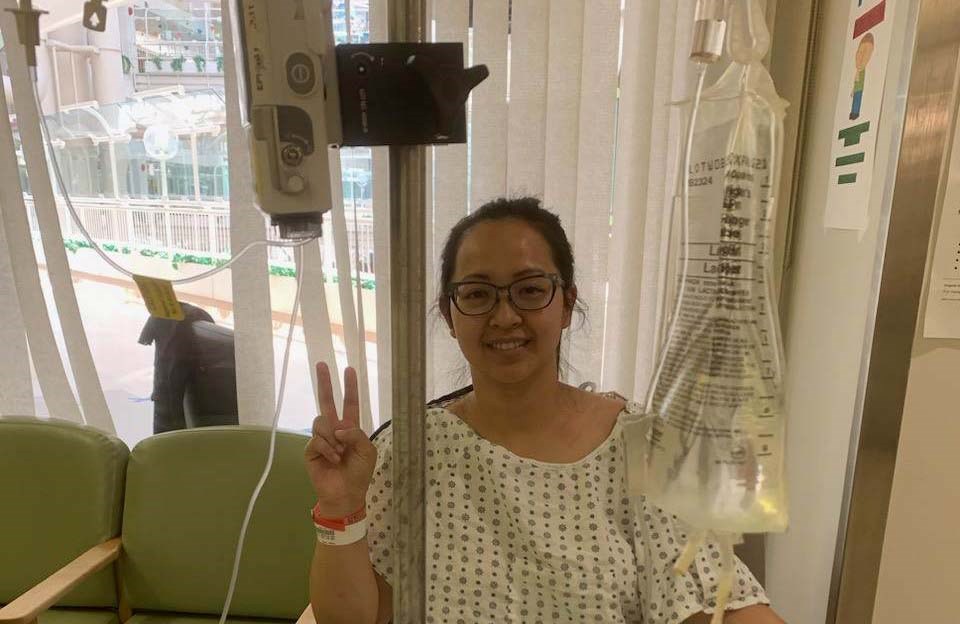"You’ve just got to keep on trying, keep on fighting."
That indomitable spirit has guided Nattiya Thatset, a St. Albert resident and alumna of Bellerose Composite, through a courageous battle with hepatocellular carcinoma since her diagnosis nearly three years ago.
Thatset's battle began on June 3, 2020 with an unexpected discovery while undergoing a COVID-19 test.
"I was going to get some COVID swabs done," Thatset said. "As the doctor was going through my medication list, he suggested that I get an x-ray because of my asthma. They found something unusual in my abdomen during the x-ray. After that, they sent me for a CT scan, at which point they discovered a tumour on my liver."
Following her diagnosis, Thatset underwent an operation to remove the tumour. Initially, the news seemed good.
"The doctors said that the tumour was gone, that I was clear of cancer."
However, her relief was short-lived. Nine months later, during a followup, she learned the cancer had returned, and it was inoperable.
"I wasn’t feeling good. At that point, I found out that the cancer had come back, and that it was inoperable, and that I wasn’t eligible for a transplant or anything like that."
Hepatocellular carcinoma (HCC) is a primary liver cancer that originates in the liver's hepatocytes, which are the most common type of liver cell. HCC is the most frequent type of liver cancer, accounting for about 75 per cent to 85 per cent of cases worldwide.
According to the Canadian Cancer Society, liver cancer is not often found until it is at an advanced stage, when it can no longer be removed by surgery.
“Certain behaviours, substances or conditions can affect your risk, or chance, of developing cancer. Some things increase your risk and some things decrease it. Most cancers are the result of many risks. But sometimes cancer develops in people who don't have any risks," reads the Canadian Cancer Society website.
“Infection with hepatitis B or C virus and cirrhosis of the liver are the main risks for liver cancer,” the CSS adds, noting the chance of developing liver cancer increases with age, more men than women develop liver cancer, and the condition is more common in countries with high rates of hepatitis B and C infection.
Early on in her battle, Thatset participated in clinical trials that proved unsuccessful, and she was then put on immunotherapy pills, which helped slow the cancer's progression.
"At first, I was doing better while taking this medication," she said. "I thought that I was slowly fighting it."
Unfortunately, complications arose.
"It caused my liver to bleed, so I had to stop taking the treatment back in November of 2022."
Now, Thatset has been told she may only have weeks to live.
Throughout this journey, Thatset's biggest source of support has been her family.
"My mom and my husband have been by my side the whole time. Without their support, I could never have lasted this long."
She also finds motivation and resilience in the precious time she spends with her loved ones, and in her gratitude for the health care system.
"I’ve been very grateful for every day of just being here beside my loved ones. That’s been my biggest motivation," she said.
When asked about an aspect of cancer or its treatment that isn't discussed enough by the general public, Thatset identified the limitations in treatment options.
"It can be frustrating at times. You ask yourself, why can’t I do this? Or why can’t I do that? But they’re just trying to do the best they can too."
She emphasizes the difficulty in meeting medical criteria for certain treatments and the challenges in receiving the care one needs.
"It’s not as if you can just automatically get a transplant just because you need one. I was surprised by how hard it can be to get the treatment that you need."
As for her advice to someone receiving a cancer diagnosis, Thatset urges perseverance and resilience.
She believes in the power of lifestyle changes to influence how one's body responds to treatments.
"That might mean a lifestyle change. Lifestyle can influence a lot of how your body reacts to the treatments that doctors will give you," she said.
Thatset said it is important to do whatever it takes.
"There’s got to be a way, or a reason to live, right?" she said. "Don’t give up."
"Be grateful for the health care system, and for being alive every day."




